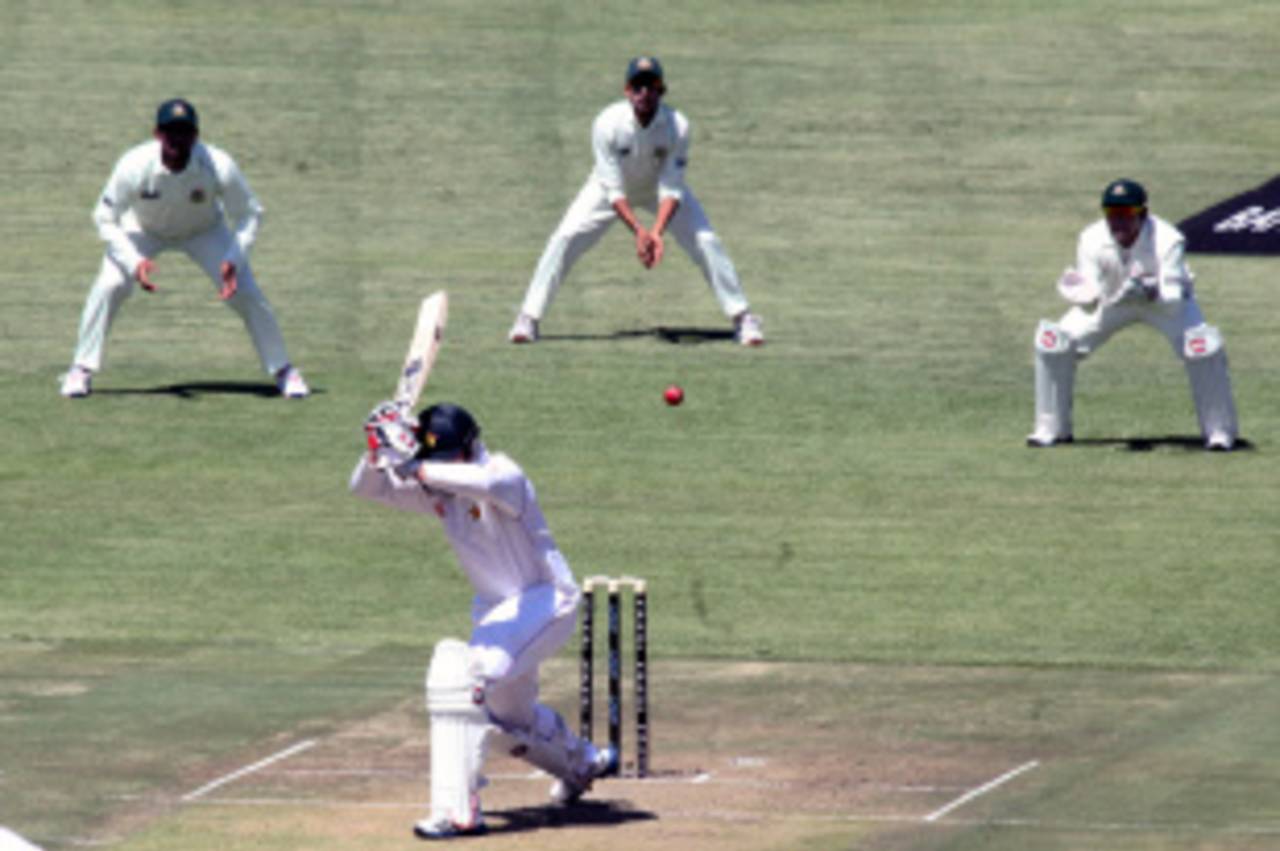Competitive, but not quality
The opening day of a low-key series was a battle for both teams, but Zimbabwe earned the right to be the happier side after Bangladesh allowed the day to drift
Firdose Moonda in Harare
17-Apr-2013

Zimbabwe's batsmen dug in on the opening day, led by their captain Brendan Taylor • Associated Press
It was not entertainment. For that, there is a tournament being played across the Indian Ocean that not many of these two teams' players will be part of. It was a slog of a different variety.
Even though Test cricket has recently been a more exciting place with run-rates in excess of six an over at times such as when South Africa took on Australia in Perth, teams bundled out for 49 and 45 courtesy of South Africa again and nail-biting contests such as New Zealand against England in Auckland, the grind had to turn up sometime. It arrived in its complete form in Harare.
Zimbabwe and Bangladesh tussled in the grubbiest way. They struggled. They fought. They forced the worst out of each other, because, if we had to honest, the standard was far from excellent and all they got out of it was the promise that tomorrow will only bring more of the same.
The underlining characteristic of this series was unlikely to be quality; it was going to be competitiveness. The former still made an appearance: Robiul Islam's opening spell which hissed with swing and seam movement, Brendan Taylor's elegant cover drive and the Enamul Hauqe delivery that turned away sharply after pitching on off and spitting up. But it was the latter that the day will be remembered for.
The opening exchanges were cagey, the middle of the day was like watching a drowning man trying to stay afloat and only towards the end did it open up, just a touch. Zimbabwe had to survive the first two periods to gain in the third. They can attribute that to none of the first three batsmen falling to anything worse than good deliveries.
Their resolve was evident even as Bangladesh's bowlers gave them a working over in the first hour. The seamers made excellent use of favourable conditions and created five chances in the first eight overs. It seemed all Zimbabwe were capable of was holding on.
The runs came almost by accident, because they were not being actively looked for. They were not batting, they were enduring. Still, few batsmen could have negotiated Robiul's yorker but it said something about the Zimbabwean mindset that it took a delivery so outstanding to crack them.
The most promising thing apart from that ball to come out of the morning was Timycen Maruma. The middle-order batsman turned opener was expected to be the first to fall and he almost did in the first over. He went on to resist for 71 minutes against a moving ball.
He left well and showed good temperament and it also took a decent delivery to remove him. Although an earlier appeal against him, also off a Robiul delivery that he went across to defend, looked a slightly better bet, replays showed that the decision to dismiss him was correct.
From there, Zimbabwe could have done what they did in the Caribbean and folded. They could also have shut up shop completely and for a while it looked as though they would.
Hamilton Masakadza continued to show caution was still the default approach and he needed to. The more patience he showed, the more impatient Bangladesh's bowlers became. It was telling that the one who showed the most, Enamul Haque Jr with his constant probing outside the offstump, eventually accounted for Masakadza.
What Zimbabwe then needed was what Taylor brought - the understanding that if they did not keep looking for runs, they would frustrate themselves into making mistakes. Malcolm Waller was the ideal partner to have in that situation. A busy cricketer, Waller ran singles hard and turned strike over well.
The pair also benefited from tiring bowlers and equally tired tactics. In the long serving tradition of Bangladesh cricket, Mushfiqur Rahim was so comfortable with his left-arm spinner, he underused Sohag Gazi. While Enamul, who did find some turn, bowled 29 overs, Gazi, who tempted the batsmen with flight, bowled just 11.
It was a waiting game as it became clear that Bangladesh were holding on for the second new ball. They allowed the game to drift and in that time, Zimbabwe cashed in. Both Taylor and Waller have obviously worked on their technique against spin. They used the sweep shot with more success than they managed in West Indies and ended up with a century stand to show for it.
Bangladesh's banking on the new ball brought reward and could have earned more as the cat and mouse resumed. Again, it became a case of Zimbabwe surviving. Again, there was movement. Again, Zimbabwe needed to concentrate on every ball as though the series itself depended on it. Again, Bangladesh seemed hold the advantage in their hand every time they ran in. But in the end, the willingness to guts it out ensured Zimbabwe finished the day relieved while Bangladesh ended it rueful.
Firdose Moonda is ESPNcricinfo's South Africa correspondent